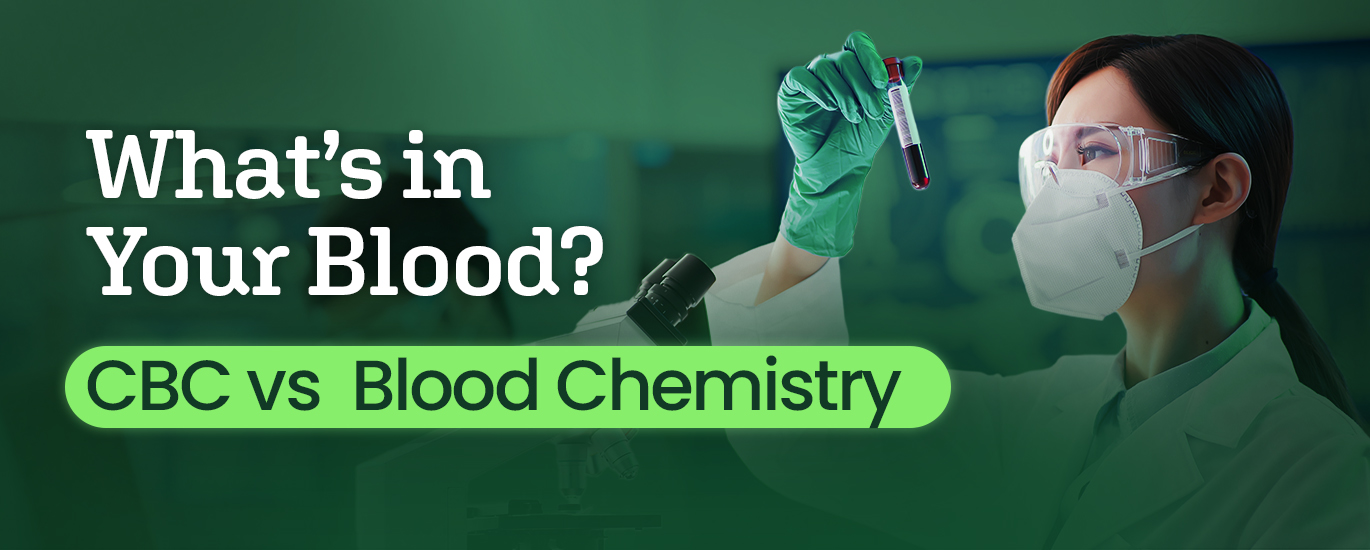Annual wellness test is a cornerstone of preventive health screening. It helps detect early signs of disease, monitor chronic conditions, and guide lifestyle or treatment decisions. Among the most commonly ordered tests are the Complete Blood Count (CBC) and the Blood Chemistry Panel. While both are essential, they offer different types of insights. Understanding the difference between CBC vs blood chemistry can help patients and clinicians choose the right test or combination for a more complete health picture.
Devansh Lab Werks (DLW) offers both the CBC and a comprehensive blood-chemistry panel as part of its annual wellness services. This blog explores what each test measures, when they’re most useful, and how DLW’s approach supports proactive care.
What is CBC and What Does it Measure?
The Complete Blood Count is a cellular-level analysis of your blood. It evaluates the quantity and quality of red cells, white cells, and platelets, offering a snapshot of your immune system, oxygen-carrying capacity, and clotting function. A CBC is often the first test ordered when patients are present with fatigue, fever, bruising, or signs of infection.
- Red Blood Cells (RBCs), Hemoglobin, Hematocrit: These markers assess oxygen transport and help detect anemia, dehydration, or chronic fatigue.
- White Blood Cells (WBCs) and Differential Count: Elevated or reduced WBCs can indicate infection, inflammation, or immune disorders. The differential count breaks down types of WBCs for more targeted insights.
- Platelets and MPV (Mean Platelet Volume): Platelet levels reflect clotting ability, while MPV helps assess platelet production and function.
- Red Cell Indices (MCV, MCH, MCHC): These values help classify anemia types and guide further testing or treatment.
What is a Blood Chemistry Panel and What Does it Reveal?
The Blood Chemistry Panel evaluates the chemical composition of blood plasma. It provides insights into organ function, metabolic balance, and nutritional status, making it essential for chronic disease monitoring and early detection. Blood chemistry panels are especially useful for patients with diabetes, hypertension, liver disease, kidney conditions, or those on long-term medications.
- Kidney and Liver Function: Markers like creatinine, BUN, AST, ALT, and bilirubin assess how well these organs are working and detect early signs of dysfunction.
- Electrolytes and Acid-Base Balance: Sodium, potassium, chloride, bicarbonate, and anion gap reflect hydration, nerve function, and pH regulation.
- Glucose and Calcium: These values help screen for diabetes, endocrine disorders, and bone health issues.
- Proteins, Lipids, and Enzymes: Albumin, total protein, cholesterol, triglycerides, and alkaline phosphatase offer insight into cardiovascular risk and nutritional status.
Blood Chemistry vs CBC: When to Use Each
Both tests serve distinct but complementary roles in preventive care. Choosing between blood chemistry vs CBC depends on the clinical question, patient history, and presenting symptoms.
CBC is ideal for:
- Investigating fatigue, infection, or unexplained bruising
- Screening for anemia, immune disorders, or blood cancers
- Monitoring bone marrow function or chemotherapy effects
Blood Chemistry is preferred for:
- Evaluating organ function and metabolic health
- Monitoring chronic conditions like diabetes or kidney disease
- Assessing medication impact and nutritional status
Use both when:
- Conducting annual wellness tests
- Managing patients with multi-system symptoms
- Establishing a baseline for long-term health monitoring
DLW Blood-Chemistry Panel: A Deeper Diagnostic Tool

Devansh Lab Werks offers one of the most extensive blood chemistry panels available, designed to support preventive care, chronic disease management, and early detection. Their CLIA-certified labs deliver results within 24 to 48 hours, with panels tailored to real-world clinical needs. Whether you’re conducting routine screening or managing complex cases, the DLW blood chemistry panel provides depth, speed, and diagnostic clarity.
- Panel Highlights:
- Includes kidney, liver, cardiac, thyroid, and metabolic markers
- Covers electrolytes, glucose, lipids, and specific proteins
- Offers specialized profiles for anemia, diabetes, bone health, and hormone balance
- Supports screening for infectious diseases, autoimmune conditions, and cardiovascular risk
- Advanced Testing Options: DLW’s panel includes cardiac markers (CK-MB, Troponin T, BNP), thyroid hormones (TSH, Free T3/T4), and nutritional indicators (Vitamin D, B12, Folate). It also features growth hormone, testosterone profiles, and inflammatory markers like CRP and procalcitonin.
- Patient-Centered Access: Available across Alabama, Texas, California, and Virginia; DLW offers mobile phlebotomy services and easy scheduling. Reports are delivered in a clear, clinician-friendly format to support timely decisions.
Why Devansh Lab Werks Is the Preferred Choice for Annual Wellness Test
Devansh Lab Werks (DLW) offers a seamless diagnostic experience that combines clinical accuracy with unmatched convenience. From routine screenings to chronic condition monitoring, DLW’s services are designed to meet the evolving needs of modern healthcare.
- Fast Turnaround: DLW delivers results within 24 to 48 hours, helping clinicians make timely decisions and patients stay proactive about their health.
- Certified Quality: All tests are processed in CLIA-certified laboratories, ensuring precision, reliability, and compliance with national standards.
- Multi-State Coverage: DLW operates across Alabama, Texas, California, and Virginia, making high-quality diagnostics accessible to a wide patient base.
- Clear and Actionable Reports: Results are presented in a clinician-friendly format, supporting quick interpretation and confident treatment planning.
- Mobile Phlebotomy at Your Doorstep: DLW’s mobile phlebotomy service brings certified professionals directly to the patient’s home, workplace, or care facility. This is especially beneficial for seniors, patients with limited mobility, or busy professionals. Samples are collected safely and transported under strict protocols, maintaining lab-grade accuracy.
Conclusion
When comparing CBC vs blood chemistry, it’s clear that each test offers unique value. The CBC focuses on blood cell health and immune function, while the blood chemistry panel reveals how your organs and metabolism are performing. Together, they provide a complete view of your internal health.
For patients seeking clarity and clinicians aiming for precision, combining both tests as part of the annual wellness screening is a smart, proactive choice. With trusted providers like Devansh Lab Werks, preventive screening becomes more accessible, accurate, and impactful.


